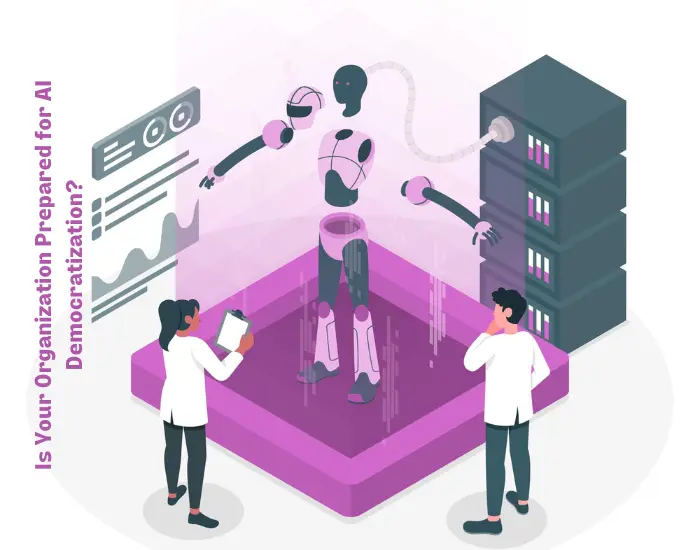Introduction
The AI revolution is upon us, and its impact is reaching far beyond the domain of tech giants and Silicon Valley. The buzzword of the hour is AI democratization, a movement to make AI tools and capabilities accessible to everyone, not just a select few data scientists and engineers. But before you rush to implement the latest AI trend, it’s crucial to ask yourself: is your organization truly prepared for this shift?
Understanding AI Democratization

Democratization Defined: While definitions vary, researchers like Mittelstadt and Floridi (2020) emphasize shifting access and control of AI development and usage from a select few to a broader range of actors. This includes non-technical users, citizens, and communities, not just data scientists and tech giants.
Drivers of Democratization: Technological advancements, such as low-code/no-code AI platforms and cloud computing, are significantly lowering the barrier to entry. Open-source tools and datasets fuel innovation and collaboration while increasing societal pressure for transparency and accountability in AI development further drives accessibility.
Potential Benefits
Research by McKinsey Global Institute (2020) highlights the potential for AI democratization to unlock widespread economic and social benefits. These include:
Innovation: Enabling new solutions and business models across diverse sectors.
Productivity: Automating routine tasks and freeing up human creativity.
Inclusivity: Democratizing access to AI tools can empower marginalized communities and reduce inequality.
Increased Effectiveness and Efficiency: Imagine marketing teams analyzing customer data and optimizing campaigns in real-time, or sales reps using AI-powered lead scoring to prioritize prospects. This is the power of AI democratization that unlocks hidden insights and streamlines workflows across departments.
Improved Decision Making: Data-driven insights become readily available to everyone, not just executives. This empowers individuals at all levels to make informed decisions based on concrete evidence, leading to better outcomes and fewer gut-feeling mistakes.
Innovation and Creativity: When everyone has access to AI tools, the potential for innovation increases. Imagine developers using AI to generate code snippets or designers leveraging AI for creative inspiration. The possibilities become endless.
Skill Development: AI democratization encourages skill development among employees who may not have a background in data science. This not only enhances their individual capabilities but also contributes to the overall skill diversity within the organization.
Challenges to Consider
Is Your Organization Prepared?
Here are some key questions to assess your organization’s readiness for AI democratization:
- Do you have a clear vision for AI adoption?
- Do you have a data governance framework in place?
- Are your employees aware of the benefits and challenges of AI?
- Do you have a plan for training and upskilling employees?
- Are you investing in user-friendly AI tools and platforms?
Roadmap to Success
Leadership Buy-in: Gartner’s research emphasizes the critical role of leadership in advancing AI democratization. Securing executive sponsorship and allocating resources for training and infrastructure is key to successful implementation.
Start Small, Scale First: A study by Forrester suggests starting with pilot projects in specific departments to demonstrate the value of AI and gather feedback before moving forward. This iterative approach allows for adaptation and refinement based on real-world experience.
Prioritize Training and Upskilling: Research from MIT Sloan Management Review highlights the importance of investing in training programs tailored to different roles and skill levels. These programs should equip employees with the knowledge and skills to effectively use AI in their daily tasks.
Facilitate Collaboration and Communication: A report by Harvard Business Review emphasizes the need for cross-functional collaboration and open communication when implementing AI democratization. Breaking down silos and encouraging knowledge sharing is critical to the successful integration and use of AI throughout the organization.
Choose the Right Tools: Research by IDC suggests investing in user-friendly, low-code/no-code AI platforms to make the technology accessible to non-technical users. These platforms should offer intuitive interfaces and readily available data sources to empower employees to build and deploy AI-powered solutions.
Focus on Ethics and Explainability: Research by the World Economic Forum highlights the importance of prioritizing transparency and fairness in AI algorithms. Implementing explainable AI models and establishing ethical guidelines are crucial to building trust and mitigating potential bias within a democratized environment.
Conclusion
AI democratization is not just a technological trend; it’s a transformative force shaping the future of work. By embracing the challenges, equipping your workforce, and prioritizing ethical considerations, your organization can harness the power of AI to unlock innovation, boost productivity, and empower employees to thrive in the AI-powered future.
Remember, the conversation on AI democratization is ongoing. Share your thoughts, research findings, and questions in the comments below! Let’s build a future where AI empowers everyone to excel.



